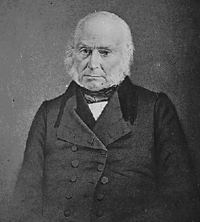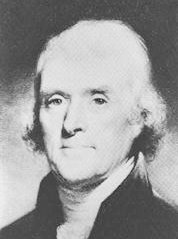It seems simple enough but it's a question that has bedevilled us since the founding of the Republic.
Are we strong because we're good or good because we're strong? Each generation has had to face that question, and the answers have varied.
Our first war was fought by Thomas Jefferson, against North African pirate city-states. In Jefferson's War, Joseph Wheelan describes this as a war chosen on the basis of a principle, that being America would not succumb to blackmail even if the Old World felt it was OK.
That was T. Jeff all the way. A claim of moral good masking naked self-interest. We stormed along the shores of Tripoli for ourselves, not our principles.
Since then many Presidents have wrapped wars of choice in principle and gotten away with it in American history books.
The Mexican War was a war of choice that opened vast territories to American conquest, and brought us out of debt through the discovery of gold in California. It remains a curious footnote in our own history books, but Mexicans are taught it as it was, a naked war of aggression for territory that made permanent America's pre-eminence on this continent. The Halls of Montezuma also reflected American self-interest. Semper Fi.
The Spanish-American War was another war of choice which brought us an empire, but Americans were told then (and are probably told now) that it was a war of liberation for Cuba, even though it was immediately followed by our first Vietnam-like conflict, against the Filipino people.
Most of our conflicts in Latin America have been colonial wars of choice, fought because we were strong, they were weak, and we wanted to exploit their assets. Few American schoolkids are taught any of this history (my son was an exception) but when you find yourself with South American friends there are curious silences only historical tensions can explain.
 It is only when we have fought one another, or fought Europeans, that the principles have come to play and we have dwelt lovingly on American exceptionalism.
It is only when we have fought one another, or fought Europeans, that the principles have come to play and we have dwelt lovingly on American exceptionalism. The same President who engaged in wars of conquest against brown people across the hemisphere was the beloved Woodrow Wilson who fought the "war to end war" against the Germanies. Franklin Roosevelt was happy to support "banana republics" in Central America, but World War II was all about principle.
Every war since Hiroshima has had this patina of principle troweled on top of self-interest. Korea. Vietnam. The Gulf War.
Liberals should not pretend that George W. Bush was the first American President to engage in a war of conquest by choice. He wasn't. In facing the crimes of this decade we need to look our whole history in the eye.
The same points which apply to strategy also apply to tactics. Americans ran Andersonville. We invented the death camp. Never mind that they were Confederate Americans. Georgians ran Andersonville to defend a system which subjugated a third of their population, which defined the father of my first friend on Winter Avenue as property, to be whipped, raped, and worked as they saw fit.
 Americans engaged in willful blindness on this point for four score and seven years, a blindness exemplified best perhaps by Jefferson himself, who agonized over the morality of slavery but nevertheless engaged in it, and went down as our great moral authority.
Americans engaged in willful blindness on this point for four score and seven years, a blindness exemplified best perhaps by Jefferson himself, who agonized over the morality of slavery but nevertheless engaged in it, and went down as our great moral authority. As opposed to John Adams, who had a black family run his farm not as slaves, but as a business transaction. Or his son John Quincy Adams (above), who spent the last 20 years of his life as an abolitionist Congressman after his own Presidency. Why do we exalt Jefferson over the Adams family? Answer that and I think you get to the heart of the torture question.
Jefferson of the beautiful mind or Adams the dull man of principle?
I stand for the dull man of principle.











